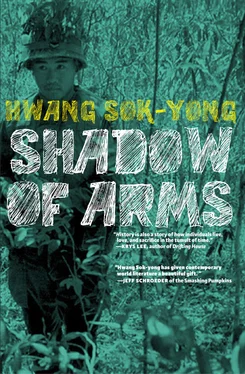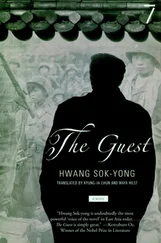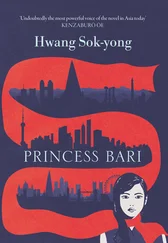Footnote:
9 United States Operations Mission
The American master sergeant in charge of the canteen was kind enough to bring out a stack of contract papers. There were twenty-eight sheets in all. The payment details were written on the back of each contract, but the documents contained little information helpful to the investigation. Stage names had been used for the singers, and for the dancers all that was recorded was the number in each performing group. It would not be possible to identify Koreans who had joined Thai or Filipino troupes — an agent received payment and distributed wages to the performers. Among the agents, the Hong Kong Group appeared most frequently in the booking records.
Yong Kyu gave up for the time being and asked the canteen sergeant, “How many times has the Korean Army Band performed here?”
The fat American with a tattoo of a rose and dagger on his hairy forearm pretended to be surprised.
“Wait, what’s this about? You said you were investigating black market dealings, so I thought. . in that case I can’t answer.”
“Fine. I’m not here to make problems. They used to be professional musicians as civilians back home. Since they’re underpaid, it’s only natural they do a little moonlighting.”
As Yong Kyu diffused the tension, the sergeant blinked and laughed out loud.
“About four times.”
“Thank you.”
As Yong Kyu started to leave, the sergeant followed him around the table, a bottle of whiskey in hand.
“Come see us again.”
Yong Kyu nonchalantly accepted the bottle. When he got into the car, Toi whistled.
“This is yours.”
“Thanks. You’re good at this.”
“Not really. I got him on a soft spot.”
“At the first meeting? In less than five minutes?”
Yong Kyu just smiled and switched on the wireless transceiver and asked for a number. He was connected to the desk at HQ. After listening to Yong Kyu’s question, a voice asked him to hold on and then read him a report.
“Market at campside, near the navy hospital. Second shop down from the Hue bar. Make inquiries to fifty-eight-year-old Vietnamese merchant by the name of Liao. Eight cartons of C-rations.”
“Got it. Roger, out.”
Yong Kyu looked over to find Toi already turning the Land Rover left in the direction of their destination.
“Goods from that side usually slip across the Thu Bon.”
“If it’s across the river, then wouldn’t it be the locals who are eating the stuff?”
“Conditions have improved, then.”
“They collect taxes in the cities.”
They parked and then walked slowly into the neighborhood near the navy hospital. The makeshift huts and crude shacks looked like the toadstools that sprout from rotting tree stumps. There were souvenir shops selling flags, handcrafts, and cheap embroidered clothes; restaurants, soda stands, and lounges doubling as brothels. The storefront signs were written both in Vietnamese and in English. Some shops were completely covered with signs.
Children were running and playing soccer in the middle of the street. Only at the sound of horns honking would they slowly disperse to let traffic pass. Young streetwalkers loitered about, peering into cars and making their offers in sweet voices.
“Quite an eyeful, this.”
“Mmm, it’s broad daylight now. You’d be shocked if you came back and saw this place at night. And this is only one of many.”
“How many satellite villages are there around the camps?”
“In Da Nang? Six in the city and ten or more on the outskirts and around the bases. But these places have nothing to do with us.”
“Why not?”
“In these places you just do whatever you can to survive. They’re under the jurisdiction of the Vietnamese national police and sometimes the ordinary MPs. That’s the way it is.”
This time Toi led the way. They went into the shop. It was about four hundred square feet, with nothing much inside except for beer and cigarettes displayed in the front window, one old Sanyo refrigerator, a table, and two chairs. The proprietor, dressed in a white shirt and black Vietnamese pants, was busy hunting flies with a fly swatter. They sat down at the table and Toi ordered beers. The owner came back with two cans of beer on a filthy tray. When Toi asked him something in Vietnamese, the shopkeeper’s expression suddenly changed and he poured out a stream of angry words.
“According to him, there’s not a single store that isn’t holding some C-rations. They liked the price, so they set a delivery date and bought up all they could with the military payment certificates they’d saved up. He’d bought about twenty cartons but was caught at the checkpoint by the river because he didn’t have any invoice. An American MP came and confiscated the goods. The Vietnamese police intervened and wrote him a cash receipt for the value of what they confiscated. But there’s nobody who will pay him the interest on so high an amount, he says. I’m not too happy about it, either.”
“The quantity of C-rations is too much, that’s the problem. Tell him that.”
“Each shop has its own stash, he says. But they aren’t doing house-to-house searches, so others don’t get caught. He was just unlucky, he says, and he shouldn’t be singled out.”
“Ask him about the woman. Tell him if we find the woman fast, he’ll get his money back right away.”
“Tall. Fair skin. Not Vietnamese, but not Western. Came with a Vietnamese driver. He thought she might be an Indian.”
“An Indian?”
“Interesting. This old man’s saying she had a big mole on her forehead. There’re lots of Indian mixed-bloods living in Da Nang.”
“All right. What did he pay?”
“He says six hundred forty dollars. The time before a different store did the buying. But there’s loyalty among the merchants, so he won’t say who it was.”
“What kind of car was it?”
“A three-quarter ton. Vietnamese army truck.”
Yong Kyu paid for the beer. They went back and got in the Land Rover. Toi shooed away the children that had gathered snooping for something to steal. Someone grabbed Yong Kyu by the arm. Upon turning around he found himself face-to-face with a smiling Vietnamese girl, around sixteen years old and frail. Yong Kyu was surprised that she wasn’t wearing any makeup.
“She knew you were a foreigner,” Toi translated as the girl spoke.
Half listening to Toi, Yong Kyu untangled himself from the young girl. The girl turned to a little boy, perhaps her brother, and shrieked at him to go away. The boy had been muttering at them the whole time.
“Do the boom boom. Very good,” the girl yelled.
Toi shouted something back at her, then they left.
“Shit. We missed lunch,” Toi grumbled.
“Good. Let’s go back to the rec center, we can get a free lunch there.”
“Are you really going to find that woman and report her to the captain?” Toi asked.
Yong Kyu paused for a moment to think before he answered. “I’m a soldier. I have a duty to obey the order of a superior. But I want to be tactful in carrying out my orders. I’m no career soldier. It’s up to you to train me.”
“I like you. Very wise. I understand you Koreans very well,” Toi said, patting Yong Kyu on the shoulder. “Your duty is to report faithfully all the details directly related to the war and to the Korean forces.”
“I’ll tell you right now that I don’t make black market deals. I’m not looking to profit from this war. But the captain and I both intend to protect Korean interests.”
Toi took one hand off the steering wheel and grasped Yong Kyu’s hand, then released it.
“I’m your friend. Sergeant Kang was not. As far as the black market is concerned, the Americans don’t trust Koreans.”
Читать дальше












